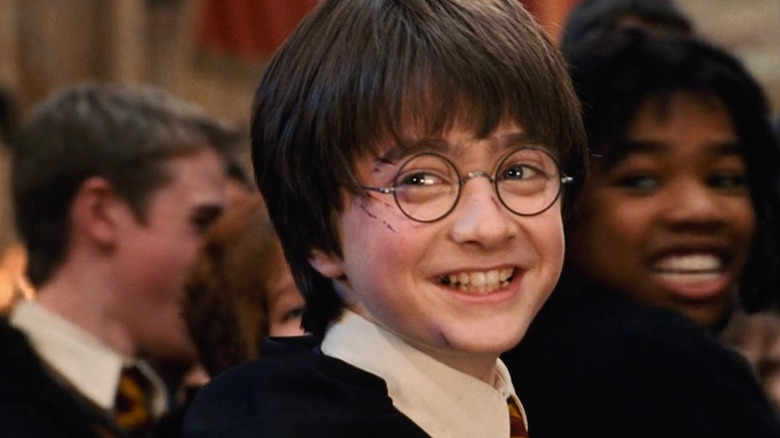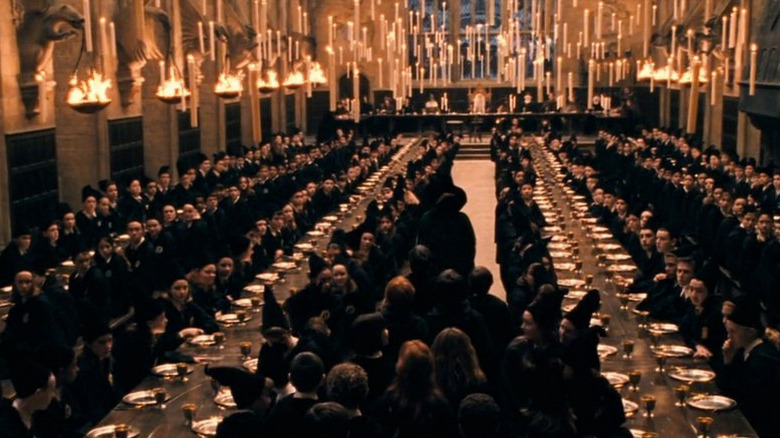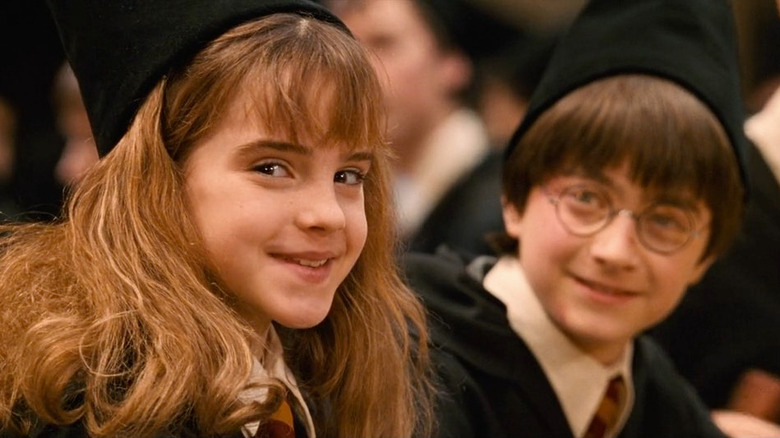Harry Potter Director Chris Columbus Was In Fear Of Being Fired Every Day On Set
Before we knew about the beliefs of author J.K. Rowling, the world fell in love with the Harry Potter books. Then we got to see them on the big screen with the eight-film series. We were introduced to actors Daniel Radcliffe, Emma Watson, and Rupert Grint, and we got to see the magical school of our childhood dreams come to life.
The first two films about the boy wizard — "Harry Potter and the Sorcerer's Stone" and "Harry Potter and the Chamber of Secrets" — were directed by Chris Columbus, who had no small amount of experience making movies that kids love. He is, of course, responsible for films like "Home Alone," "Home Alone 2: Lost in New York," "Adventures in Babysitting," and "Mrs. Doubtfire." That didn't mean that he wasn't nervous about taking on a franchise like this, however. People, including myself, would line up at midnight in our Hogwarts House scarves to get each new book and stay up all night reading it to the end. Babysitters and the children they read the books to alike dreamed of getting their Hogwarts owl saying they'd been accepted to the school for Witchcraft and Wizardry, saw themselves are the brainy Hermione, or wished for their own magical mentor like Dumbledore.
This was no small thing that Columbus was taking on. That said, according to a 2020 Collider interview with Columbus, he was worried about being fired every day on set at the beginning of his Hogwarts tenure.
'I just had to hide that side of my emotions'
Columbus knew that the first film could make or break the rest of his career, as beloved as those books were. He said, "The reality is the pressure of the world was upon us, and on me particularly because I knew if I screwed this one up it's all over. You can't screw up this book." He said he had to focus and not think about that, but that it was "a lot easier 19 years ago before the Internet blew up." A truer statement was never uttered. Even all these years later, a quick search on social media about these films will bring up critiques, but we didn't all live perpetually online when the franchise started. Not as much, anyway. That didn't keep the nerves from Columbus, though. He explained:
"The first film was fraught with anxiety for me. The first two weeks I thought I was gonna get fired every day. Everything looked good, I just thought if I do one thing wrong, if I f*** up, I'm fired. And that was intense. I didn't let any of that show on the set, there was no frustration, I'm not a screamer, I get along with everybody and I want everybody to feel like they're part of the family, so I just had to hide that side of my emotions."
It obviously worked. While there are certainly fans who think of the first two films as less dramatic and more like a kid's fantasy than the other ones, you can say the same things about the books. They seem to mature as the characters do.
Letting kids be kids
There is this sort of — I'm not going to apologize for using this word — magic about the way child actors seem to respond to Columbus's direction in the "Harry Potter" films. Stressed out or not, he brought out performances here (and certainly in his other works) that let the kids seem like actual, real kids. That's no small feat in an industry where every child actor seems preternaturally adult or unusually clever. It's not that we don't want to see a cool kid worth telling a story about solving a problem, but often, kids in movies can be portrayed as far more intelligent than any adult.
There is nothing wrong with that, but personally (both now and when I was a kid) I prefer seeing a kid that seems like they're at my level, but with an extra bit of perseverance or drive or a personality trait that lets them do extraordinary things. It makes it seem more in reach, I suppose. It gives you the ability to put yourself in the shoes of the protagonists and think that if you'd just been sent an owl, maybe you could have done the same. There is an art to that which Columbus seemingly mastered.
The "Harry Potter" films are streaming on Max.


